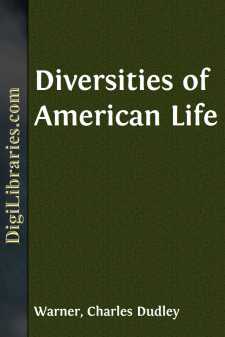Literary Collections
- American 84
- Ancient, Classical & Medieval 14
- Asian 1
- Australian & Oceanian 1
- Canadian 55
- Continental European 121
- English, Irish, Scottish, Welsh 179
- Essays 160
- General 24
- Letters 46
- Middle Eastern 1
Literary Collections Books
Sort by:
Weep with me, all you that readThis little story;And know, for whom a tear you shed,Death's self is sorry. Ben Jonson. This story is no invention of mine. I could not invent anything half so lovely and pathetic as seems to me the incident which has come ready-made to my hand. Some of you, doubtless, have heard of James Speaight, the infant violinist, or Young Americus, as he was called. He was...
more...
by:
Louis Becke
On the 22nd of July, 1828, the Sydney South Seaman, Indefatigable, eleven days out from the Port of Conception in Chili, was in lat 17? S. and about 127? E. long., six hundred miles distant from the nearest land—the then almost unknown Paumotu Group, which Cook had well named the Dangerous Archipelago. Five years before, the brig was named the Calder, and was then commanded by Captain Peter Dillon, a...
more...
by:
Louis Becke
To many people in England the mention of Australia conjures pictures of tented gold-fields and tall, black-bearded, red-shirted bushrangers; of mounted police recruited from "flaxen-haired younger sons of good old English families, well-groomed and typically Anglo-Saxon"; of squatters and sheep runs; of buckjumpers ridden by the most daring riders in the world; and of much more to the same...
more...
by:
Edward Eldridge
CHAPTER I. CLARA LAWTON. "Well, dear," said Mrs. Lawton to her daughter Clara, "the home you will enter to-morrow as a bride is very different from the home that I entered as your father's bride. Our home was a log cabin in the Michigan woods, with only an acre of clearing, where the growing season is only about four months long and the winter eight. Snow lay on the ground six months...
more...
by:
W. Warner
Gallick Reports: Or, A Collection of Criminal Cases adjudg'd in the Courts of Judicature in France. In which is Comprized, An Account of Arnold du Tilh, an Impostor, who deceived a Man's Wife and Relations, and puzzled, for a long Time, the Parliament of France. Memoirs of the famous Madam de Brinvilliers, who poisoned her Father, and two Brothers, and attempted the Life of her Sister,...
more...
by:
Bret Harte
JIMMY'S BIG BROTHER FROM CALIFORNIA As night crept up from the valley that stormy afternoon, Sawyer's Ledge was at first quite blotted out by wind and rain, but presently reappeared in little nebulous star-like points along the mountain side, as the straggling cabins of the settlement were one by one lit up by the miners returning from tunnel and claim. These stars were of varying brilliancy...
more...
PREFACE. It was most reluctantly that I determined to suspend, during the last autumn, a work which is the business and the pleasure of my life, in order to prepare these Speeches for publication; and it is most reluctantly that I now give them to the world. Even if I estimated their oratorical merit much more highly than I do, I should not willingly have revived, in the quiet times in which we are so...
more...
by:
Honore de Balzac
STUDY OF A WOMAN The Marquise de Listomere is one of those young women who have been brought up in the spirit of the Restoration. She has principles, she fasts, takes the sacrament, and goes to balls and operas very elegantly dressed; her confessor permits her to combine the mundane with sanctity. Always in conformity with the Church and with the world, she presents a living image of the present day,...
more...
This is a very interesting age. Within the memory of men not yet come to middle life the time of the trotting horse has been reduced from two minutes forty seconds to two minutes eight and a quarter seconds. During the past fifteen years a universal and wholesome pastime of boys has been developed into a great national industry, thoroughly organized and almost altogether relegated to professional...
more...
by:
Ralph Bergengren
THE PERFECT GENTLEMAN Somewhere in the back of every man's mind there dwells a strange wistful desire to be thought a Perfect Gentleman. And this is much to his credit, for the Perfect Gentleman, as thus wistfully contemplated, is a high ideal of human behavior, although, in the narrower but honest admiration of many, he is also a Perfect Ass. Thus, indeed, he comes down the centuries—a sort of...
more...











